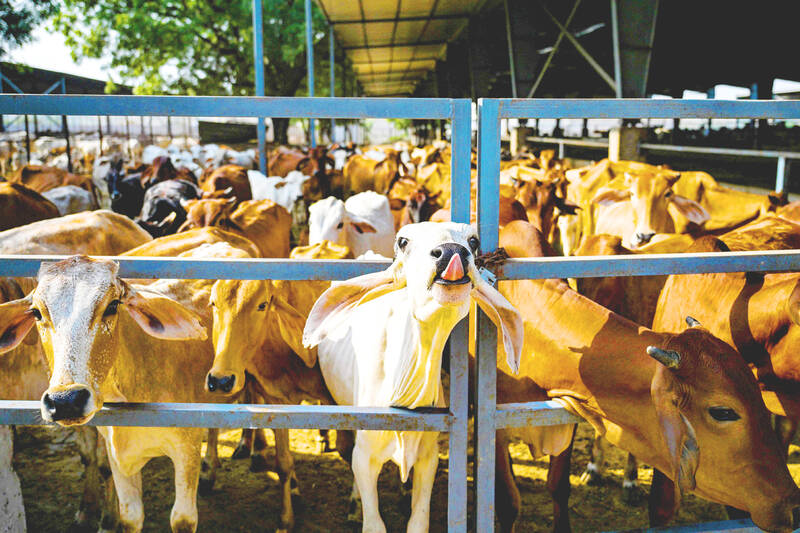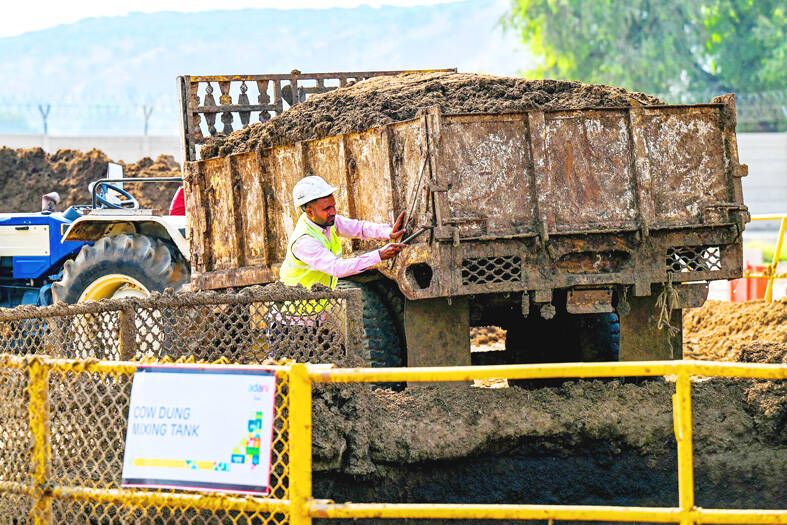Venerated as incarnations of Hindu deities, India’s sacred cows are also being touted as agents of energy transition by a government determined to promote biogas production to cut its dependence on coal.
It is an understatement to say that Nakul Kumar Sardana is proud of his new plant in Barsana, in India’s northern Uttar Pradesh state.
Primarily because it occupies “one of the holiest sites in the world,” said the vice-president of a biomass joint venture between India’s Adani Group and France’s TotalEnergies SE.

Photo: AFP
A four-hour drive south of the smog-filled capital, New Delhi, among fields bristling with brickyard smokestacks, the small town of Barsana welcomes pilgrims who come to honor the Hindu goddess Radha.
Sardana is also proud because his methanization plant that opened in March is the “most technologically advanced and the largest biogas facility” in India.
It was built in Barsana to be as close as possible to its raw fuel — cattle dung and harvest stubble.

Photo: AFP
“This region is home to a million cows,” Sardana said. “Their dung has been used as fuel for centuries in cooking.”
Cows have been blamed for contributing to global warming because they produce methane — a powerful greenhouse gas — in their manure or when they belch.
In this case, the region is finding a creative use for the waste produced by the cattle, which are used for their milk. Eating them is taboo for many Hindus.
Stalks left behind after the rice harvest — which would otherwise be burned — join the slurry.
“Farmers are traditionally burning them, creating smog and pollution,” Sardana said. “In using natural waste, we are not only producing compressed biogas, but also high-quality organic fertilizer.”
Long lines of tractors dump dung and straw in the factory’s tanks, from which 10 tonnes of gas and 92 tonnes of fertilizer are produced each day.
In its endless quest for power to fuel its economic growth, the world’s most populous nation — and third-largest fossil fuel polluter — has pushed biogas to achieve a much-promised transition to carbon neutrality by 2070.
In 2018, the government set itself an ambitious goal of building 5,000 biogas plants in six years.
Despite generous subsidies and the introduction of a buyback guarantee, the project attracted little initial interest — until the government forced the hand of producers. From April next year, at least 1 percent of liquid gas fueling vehicles and used for domestic use must be biogas — rising to 5 percent by 2028.
That prompted a response from key players, starting with billionaires Mukesh Ambani and Gautam Adani — both close to Indian Prime Minister Narendra Modi — eyeing lucrative public contracts.
Ambani promised his Reliance Industries Ltd would build 55 biogas plants by the end of 2025 to convert “food producers to energy producers” and generate 30,000 jobs.
His rival Adani plans to invest about US$200 million in the sector in the next three to five years.
“The government is pushing to convert waste for the wealth of the country,” said Suresh Manglani, CEO of Adani Total Gas Ltd.
The International Energy Agency said that China and India are leading global growth in bioenergy, seen as one solution to mitigate global heating.
Even though biofuel remains more expensive than conventional gas, Indian production is expected to grow by 88 percent by 2030, it the agency said.
Biogas is considered a clean energy because the waste used to produce it is completely natural, said Suneel Pandey, director of circular economy and waste management at The Energy and Resources Institute, a New Delhi-based research institute.
It is “a sustainable solution to make wealth from waste,” he said.
However, the contribution of biogas to India’s transition away from heavily polluting coal — currently fueling nearly 70 percent of electricity — would be relatively small.
India plans to more than double the share of gas in its energy mix — from 6 to 15 percent by 2030, but the bulk of that would be liquefied natural gas (LNG), with Adani and TotalEnergies opening an LNG port on India’s eastern coast at Dhamra.
Burning gas to produce electricity also releases damaging emissions, although less than coal and oil.
Total said its backing of biogas is more about environmental responsibility than commercial opportunity.
“Biogas goes way beyond figures and business plans,” TotalEnergies chairman and managing director for India Sangkaran Ratnam said.
“It has also a tremendously positive knock-on effect on the rural communities in terms of jobs, in terms of care for the environment, and alternative forms of income,” he said.
Tejpreet Chopra, head of renewable energy company Bharat Light and Power Pvt Ltd, said the biogas market is “small in the big picture of things” but the “potential is huge.”
However, the investments required are vast. The Barsana plant cost US$25 million, while the price of biogas remains uncompetitive: US$14 per cubic meter, compared with US$6 for LNG.
Yet Sardana said he is more convinced than ever that biogas is key.
“We will learn the nuts and bolts of it and improve all processes,” he said. “We stop wasting energy, we create rural jobs, and we are contributing to a more sustainable environment.”

‘SWASTICAR’: Tesla CEO Elon Musk’s close association with Donald Trump has prompted opponents to brand him a ‘Nazi’ and resulted in a dramatic drop in sales Demonstrators descended on Tesla Inc dealerships across the US, and in Europe and Canada on Saturday to protest company chief Elon Musk, who has amassed extraordinary power as a top adviser to US President Donald Trump. Waving signs with messages such as “Musk is stealing our money” and “Reclaim our country,” the protests largely took place peacefully following fiery episodes of vandalism on Tesla vehicles, dealerships and other facilities in recent weeks that US officials have denounced as terrorism. Hundreds rallied on Saturday outside the Tesla dealership in Manhattan. Some blasted Musk, the world’s richest man, while others demanded the shuttering of his

ADVERSARIES: The new list includes 11 entities in China and one in Taiwan, which is a local branch of Chinese cloud computing firm Inspur Group The US added dozens of entities to a trade blacklist on Tuesday, the US Department of Commerce said, in part to disrupt Beijing’s artificial intelligence (AI) and advanced computing capabilities. The action affects 80 entities from countries including China, the United Arab Emirates and Iran, with the commerce department citing their “activities contrary to US national security and foreign policy.” Those added to the “entity list” are restricted from obtaining US items and technologies without government authorization. “We will not allow adversaries to exploit American technology to bolster their own militaries and threaten American lives,” US Secretary of Commerce Howard Lutnick said. The entities

Minister of Finance Chuang Tsui-yun (莊翠雲) yesterday told lawmakers that she “would not speculate,” but a “response plan” has been prepared in case Taiwan is targeted by US President Donald Trump’s reciprocal tariffs, which are to be announced on Wednesday next week. The Trump administration, including US Secretary of the Treasury Scott Bessent, has said that much of the proposed reciprocal tariffs would focus on the 15 countries that have the highest trade surpluses with the US. Bessent has referred to those countries as the “dirty 15,” but has not named them. Last year, Taiwan’s US$73.9 billion trade surplus with the US

Prices of gasoline and diesel products at domestic gas stations are to fall NT$0.2 and NT$0.1 per liter respectively this week, even though international crude oil prices rose last week, CPC Corp, Taiwan (台灣中油) and Formosa Petrochemical Corp (台塑石化) said yesterday. International crude oil prices continued rising last week, as the US Energy Information Administration reported a larger-than-expected drop in US commercial crude oil inventories, CPC said in a statement. Based on the company’s floating oil price formula, the cost of crude oil rose 2.38 percent last week from a week earlier, it said. News that US President Donald Trump plans a “secondary